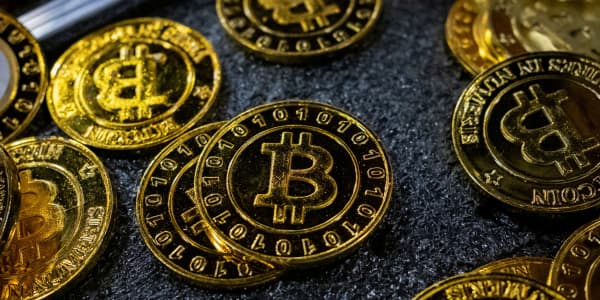Investors interested in metals usually stick to the precious ones — gold and, if dabbling beyond that, maybe silver.
But President-elect Trump's plans to shore up infrastructure and bring back manufacturing means that good times are rolling for industrial metals. Even before Trump, obscure metals like tin were prospering this year as demand rose and supplies shrank. Trump's ambitious plans could give industrial metals additional momentum as base metals including copper, aluminum and lead are essential ingredients in construction and manufacturing.
The base metals boom comes during a big gold slump — after a record rally in the first half of the year, gold is down 15 percent in the past three months and now sits at a 10-month low, a swift change of fortune for the popular SPDR Gold Trust (GLD).
"Rising commodity prices are upon us," said Todd Rosenbluth, director of ETF and Mutual Fund Research at CFRA. "And there are also diversification benefits to having commodity exposure."
Raw materials drive cyclical industries such as machinery and aerospace, which are expected to be strong in 2017, Rosenbluth said.
There is one big ETF in this space, with assets of nearly $300 million, the PowerShares DB Base Metals Fund (DBB). It focuses on the three most-traded metals: aluminum, copper and zinc. DBB has logged a hefty 32 percent return so far this year.
Precious vs. base
| ETF | QTD performance (%) | YTD performance (%) | 1-month (%) | Expense ratio | Assets ($) |
|---|---|---|---|---|---|
| SPDR GLD | (-14.6) | 5.8 | (-8.4) | 0.4 | 31.7B |
| PowerShares DBB | 11.7 | 32 | 3 | 0.78 | 289M |
(Source: XTF.com)
But more niche metals markets like tin and lead are also hitting their stride.
Except for one large ETF, base metals plays are mainly found in an unlikely investment vehicle: exchange-traded notes (ETNs), which are similar to ETFs with one big difference: They are debt-backed securities, trade on very low volume compared to ETFs and also have very small asset bases compared to ETFs.
As such, most investors haven't heard of ETNs, and if they did, it was probably during the financial crisis, when ETNs made it into the headlines because financially troubled banks were among those providing the debt structure, placing the ETNs in an existential crisis.
More from ETF Strategist
Investors rushing into equity ETFs at pace not seen since (uh-oh) Sept. 2008
There is only one inflation hedge that investors think will work this time
Buffett's 'best single measure' of valuation is flashing danger for stocks
ETNs are finally having their day, and there aren't many other diversified base metals trading out there.
They're mainly found in a series of iPATH industrial-metal ETNs offered by Barclays, which reflect returns on a specific commodity index along with the ETN value. The iPath Bloomberg Subindex Industrial Metals Total Return ETN (JJM) is up 31 percent this year.
And other iPath ETNs structured around bets on tin (JJT), nickel (JJN) and copper (JJC) have done very well this year, though the trades hit at least a short-term wall in the past month.
The niche metal plays
| ETN | QTD performance (%) | YTD performance (%) | 1-month (%) | Expense ratio | Assets ($) |
|---|---|---|---|---|---|
| Industrial Metals (JJM) | 15 | 30 | 2.8 | 0.75 | 7.7M |
| Copper (JJC) | 19 | 21.5 | 3.6 | 0.75 | 64M |
| Nickel (JJN) | 7 | 28 | (-0.5) | 0.75 | 11.7M |
| Tin (JJT) | 5.8 | 49.7 | (-4.8) | 0.75 | 3.7M |
(Source: XTF.com)
"Once you get past copper and aluminum, these are obscure movers, though," says Dave Nadig, CEO of ETF.com. Tin, for example, has unbelievable price swings, he said, since the market is limited and can collapse just as easily.
"All industrial metals are boom-and-bust, however," he said. "So stick with the leaders in the space."
Neena Mishra, director of ETF Research at Zacks Investment Research, is not a fan of making a big bet on a base metals trade. "It's hard to predict industrial metals' movements," she said. "They've been going up after many years of a bearish trend."
She noted that some of the smaller iPath ETNs have low volume and aren't cheap, with expense ratios at 75 basis points. But the PowerShares DB Base Metals ETF has a similar expense ratio.

"There's a wide range of metals out there," said Jason Bloom, Invesco PowerShares director of commodities and alternatives product strategy. "But these three primary ones [aluminum, copper and zinc] are very liquid and trade globally. They perform well late in business cycles when equities flatten out, since they're tied to manufacturing."
Industrial-metal demand is mainly driven by China. "The country consumes about half the metals. And the Chinese have been making huge investments in their utility grid and transportation. That's huge for aluminum and copper," he said.
Zinc is another growth story. It's used to make steel. "And zinc supply has come way down," Bloom said. Prices are supported, he said, because global mines went bankrupt.
Experts warn that ETNs haven't proved to be the most long-lived investments. Banks tend to be the ones to launch ETNs. They get popular, and then issuers sometimes shut them down, Nadig said. Deutsche Bank and Credit Suisse have already closed ETNs this year. "So it's an appropriate time to be cautious about them," Nadig said.
This is one reason ETNs tend to be created not for mass marketing to investors but for an institutional client or clients of the bank looking to execute a specific trade. "Anyone can trade and buy them, but a lot are tailored to a particular client," said Igor Zilberman, head of research at XTF.com.
Rosenbluth reminds investors that ETFs still have a big advantage over ETNs; they trade easily on an exchange in much higher volume and with greater liquidity.
And Barclays warns investors about the debt structure, advising investors that "ETNs are riskier than ordinary, unsecured debt securities and have no principal production."
Zilberman said the credit structure "is not that big a deal," at least not when placed side by side with the big risk: This is trading in a very volatile space of the market.
"It's the commodity business. There is no assurance," Zilberman said.
— By Constance Gustke, special to CNBC.com




